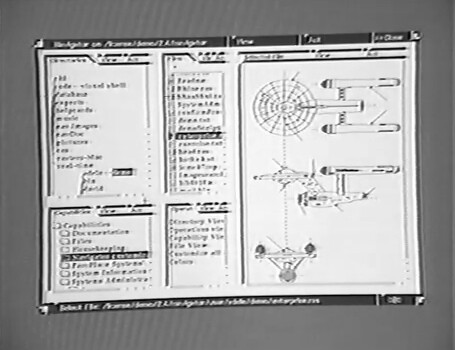Now, to provide a bit of modern context, we’ll have to start on a tangent. On Hacker News, there’s an article at ThoughtStorms Wiki featured, which argues for a “SmallTalkUnix”. The point of this article is about Smalltalk missing the chance of connecting to UNIX by missing the importance of text files.
There’s nothing that can’t be represented by a good text file. I’ll go further and say that it’s denial of text-files (and the underlying file-system standards, text file management tools) that ultimately killed SmallTalk. Had someone seen this clearly in 1980, and figured out how make a transparent two-way connection between Smalltalk space and text-file space, we might have seen a very different evolution of computing : a true synthesis of Smalltalk and Unix.
Smalltalk could have become the graphical shell on top of Unix, providing it instantly with a sophisticated GUI (rather than wait for the X consortium to re-invent the wheel), in a language that was optimised for GUI programming (rather than C and then the hell of C++). Smalltalk would have been the default OO language for professional GUI apps. on workstations from Sun and Silicon Graphics. It would have been the default scripting language in Unix.
Well, this may have been quite remarkable, if this had ever happened. This really looks like an entrance to an interisting hole, and it’s certainly rabbit-sized, so we really should follow this all way down.
As usual, a Hacker News link comes with a discussion, and it’s in this very discussion that HN users reminded us that there had been such a thing, namely Smalltalk used as a UNIX shell for the Ardent Titan “mini-supercomputer”. And there are also some links!
The Rhode Island Computer Museum (RICM) has a page on the Ardent Titan Graphics Supercomputer, which came with AT&T System V.3 UNIX and Berkeley 4.3 UNIX and supports VAX/VMS extensions and CRAY vectorizing directives. The graphics in “Graphics Supercomputer”, came with Navigator for UNIX, a graphical Smalltalk shell with a demo version of Smalltalk 80.
In 1987, it could be all yours, beginning at list price of $79,000.
There’s also a running example at VAXBARN and a YouTube video of it, but, alas, this does not show Navigator for UNIX.
However, HeavenEverywhere Media has a dedicated page “A Navigator for UNIX”, including screenshots and even a QuickTime movie for download. (Sadly, this file isn’t compatible with current versions of QuickTime Player. Better formats may be available via ACM SIGGRAPH, Video Review Library, Issue 46, CHI’89 demos.)
So Navigator for UNIX was designed/developed by Adele Goldberg, Stephen T. Pope and David Leibs, apparently at Xerox Parc (I guess). Implementation by David Leibs, Stephen T. Pope, and Tom Wadlow. The description goes as follows:
The ParcPlace Navigator for UNIX is/was a novel user interface paradigm for managing large volumes of structured data. It used the browsing model of paths, places, and contents together with a division of items into data (files) and capabilities (tasks or scripts) in a unique 5-paned GUI we called the SwissArmyKnife view.

(Navigator for Unix, screenshot / video still via HeavenEverywhere Media.)
This is indeed an interesting alternate history of computing. May we call this scenario “Adele’s revenge”? ![]()
Links:
- “SmallTalkUnix” at ThoughtStorms Wiki
- HN discussion
- Ardent Titan Graphics Supercomputer (hardware) at RICM
- YouTube video of running Ardent Titan at VAXBARN
- “A Navigator for UNIX” (software, screenshots) at HeavenEverywhere
